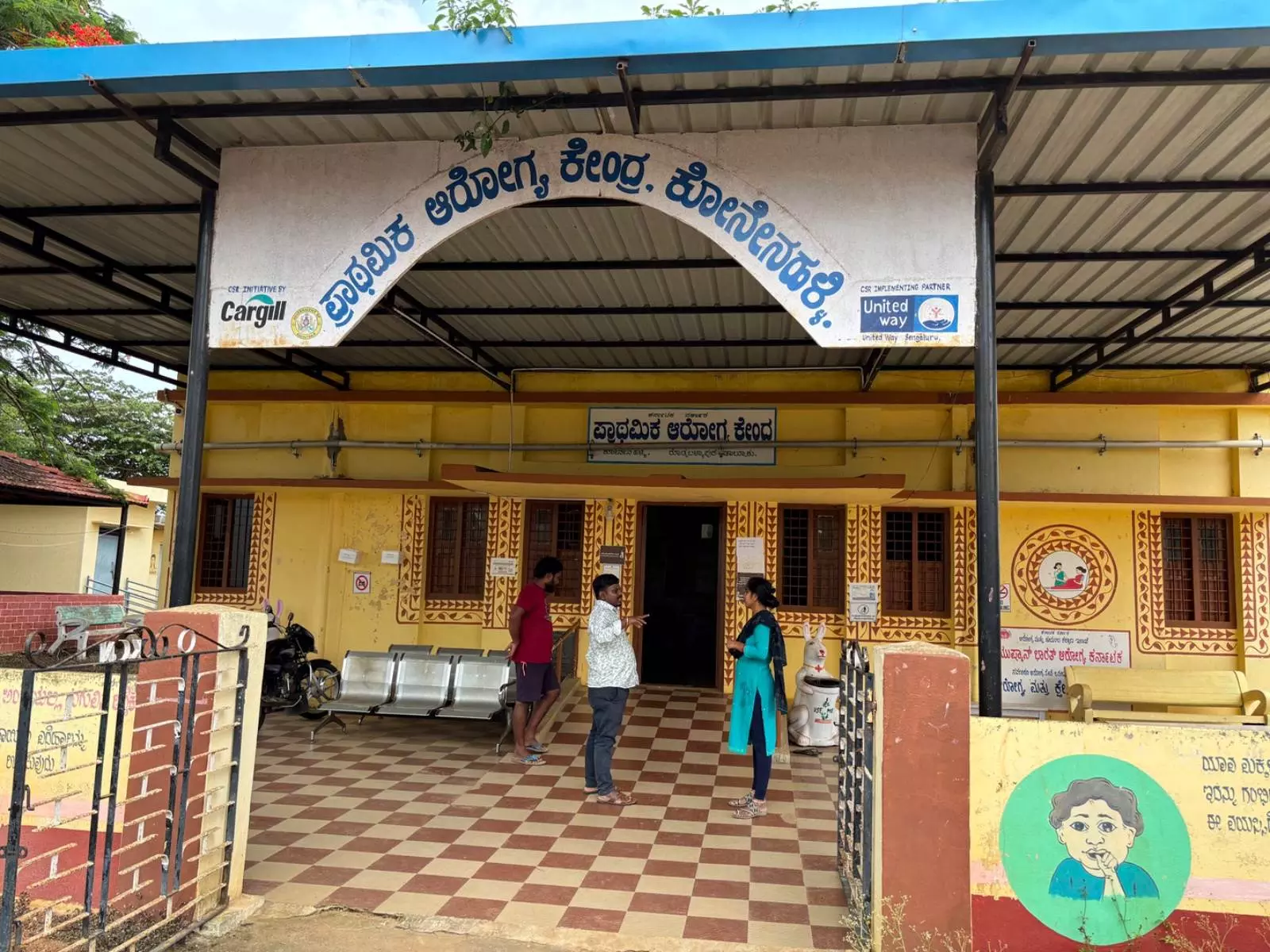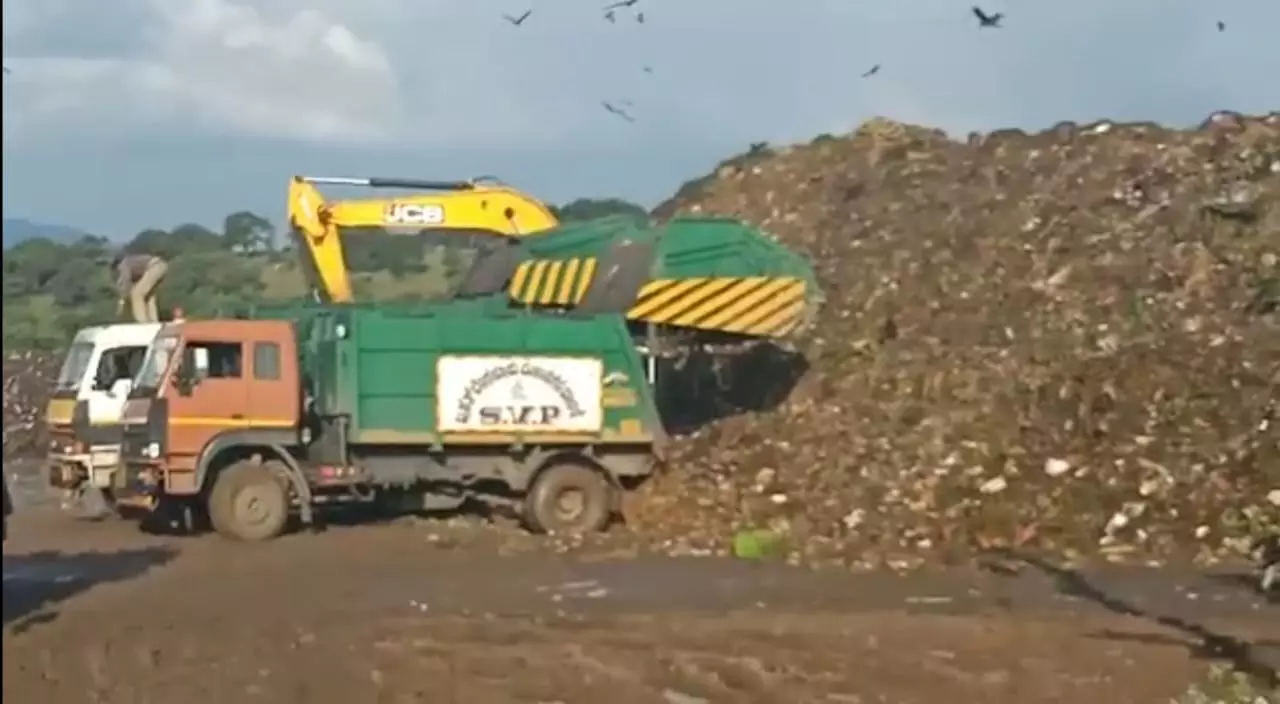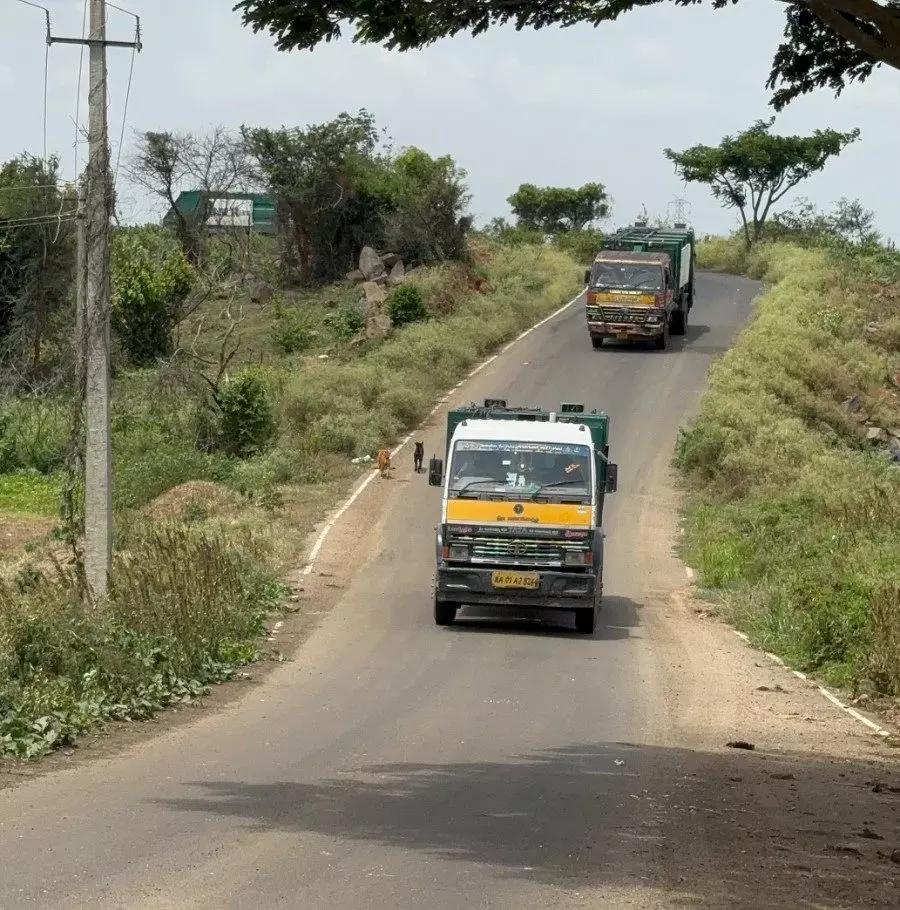
- Home
- India
- World
- Premium
- THE FEDERAL SPECIAL
- Analysis
- States
- Perspective
- Videos
- Sports
- Education
- Entertainment
- Elections
- Features
- Health
- Business
- Series
- In memoriam: Sheikh Mujibur Rahman
- Bishnoi's Men
- NEET TANGLE
- Economy Series
- Earth Day
- Kashmir’s Frozen Turbulence
- India@75
- The legend of Ramjanmabhoomi
- Liberalisation@30
- How to tame a dragon
- Celebrating biodiversity
- Farm Matters
- 50 days of solitude
- Bringing Migrants Home
- Budget 2020
- Jharkhand Votes
- The Federal Investigates
- The Federal Impact
- Vanishing Sand
- Gandhi @ 150
- Andhra Today
- Field report
- Operation Gulmarg
- Pandemic @1 Mn in India
- The Federal Year-End
- The Zero Year
- Science
- Brand studio
- Newsletter
- Elections 2024
- Events
How Bengaluru’s garbage is ruining lives of villagers in Karnataka’s Doddaballapur
A solid waste unit in Chigaranahalli has turned into a nightmare for Doddaballapur villages ; hundreds suffer health issues, farmland lies poisoned and women from ‘polluted zone’ remain unmarried

In Karnataka’s Doddaballapur taluk, just 54 km from Bengaluru, villages around Chigaranahalli are in the throes of a crisis. A Municipal Solid Waste processing unit, set up over a decade ago to handle Bengaluru’s garbage, has upended life in the region. Run by Material Solutions for Green Planet (MSGP), a Bangalore-based private firm, since 2014, the Chigaranahalli waste unit...
In Karnataka’s Doddaballapur taluk, just 54 km from Bengaluru, villages around Chigaranahalli are in the throes of a crisis. A Municipal Solid Waste processing unit, set up over a decade ago to handle Bengaluru’s garbage, has upended life in the region. Run by Material Solutions for Green Planet (MSGP), a Bangalore-based private firm, since 2014, the Chigaranahalli waste unit processes nearly 500 tonnes of waste from the state capital daily.
Though meant to serve urban cleanliness goals, it has become a source of endless suffering for rural communities. The environmental fallout has been devastating: families, with deteriorating health, are migrating, and perhaps most poignantly, marriages are no longer taking place.
In about five to six villages — Chigaranahalli, Tanneeranahalli, Kadatippuru, Gundlahalli, and Moodlu Kalehalli — more than 150 young men have remained unmarried despite crossing the typical marriageable age. Many are now over 35 and even nearing 40, yet they remain single, not by choice, but because families from other villages refuse to marry their daughters into what is now seen as a “polluted zone.”
“When bride-seekers come to our village, they are welcomed not by family members but by swarms of flies and the foul smell from the waste unit. That alone makes them reject the match,” said Gururaju T.K., a resident of Tanneeranahalli. “Families from outside fear that their daughters might develop health problems due to the polluted environment. Even our girls are being rejected in marriage proposals.”
Also read: Pulicat women bottle palm nectar, revive Tamil Nadu’s neglected palmyra trees
This fear is not entirely unfounded. For over a decade, women in these villages have been living amidst toxic air, contaminated water, and continuous foul odours. There is a widespread belief that such exposure could affect pregnancy and children’s health. As a result, more than 25 women aged over 30 are also unmarried. “There have been many instances where parents of brides have walked away mid-discussion after seeing the garbage heaps in our village,” said Rangappa, a local farmer. “We are losing not just our health but our futures.”
According to residents, there has been a sharp increase in respiratory diseases, skin issues, and most tragically, miscarriages among women. “Our farmland is just 200 metres from the waste plant,” said Ravi Kumar T.K. from Tanneeranahalli. “We dug a borewell for our arecanut plantation, but the groundwater was already poisoned. Over 250 arecanut trees dried up. Even the animals have no clean water to drink. My wife had a miscarriage last year. This plant must be shut down immediately.”
Over the last 20 years, the villages surrounding the waste units — especially near the Terra Firma and MSGP plants — have seen an alarming number of miscarriages. According to Gururaju, in Tanneeranahalli alone, around 12 women have suffered miscarriages. He adds that across the affected villages, the number is likely far higher.

A Primary Health Centre located near the MSGP unit.
Medical professionals and environmental experts agree with these claims. Dr. Asha Benakappa, former director of Indira Gandhi Children’s Hospital, warned that toxic chemicals in drinking water — like high levels of copper and chromium — can lead to severe pregnancy complications, low birth weight, developmental disorders, and even organ failure.
While local health officials downplay the severity, they do acknowledge the rise in respiratory and skin-related issues. “We didn’t find any confirmed cases of miscarriage,” said Dr. Shalini, Medical Officer at Hulikunte Primary Health Centre. “But children and senior citizens are indeed suffering from breathing and skin problems. We are providing them with appropriate treatment.”
The issue has now reached political corridors. “For the past 15 years, the Municipal Solid Waste (MSW) plant has caused many problems. The drinking water and air have become polluted. People in nearby villages are being forced to leave their homes and move elsewhere,” said Dheeraj Muniraju, MLA of Doddaballapur Constituency. “Since 2008, school admissions in government schools in the area have dropped significantly. The government should shut down the MSW plant.”
Yet, administrative hurdles remain. Tahsildar Vibha Vidya Rathod clarified that the local Taluk administration has no power over the plant’s operations. “The BBMP is completely in charge. The Taluk administration cannot interfere. However, the Health Department is regularly conducting health camps in the affected villages.” This bureaucratic deadlock has only frustrated the villagers more. Despite protests and repeated complaints, there has been no meaningful response from authorities.
The youth in these villages are now choosing to leave their ancestral homes in search of better lives and marriage prospects. “Because of the unbearable stench and the lack of clean water, many young men leave after finishing their studies,” said Bhimaraju, a former Panchayat member of Tanneeranahalli. “They go to Doddaballapur, Dabaspete, or Tumakuru in search of work and better living conditions.”
This exodus is slowly emptying out these once-thriving villages. Meanwhile, those left behind — especially the elderly — struggle with poor health and no one to care for them. “The ponds, streams, and tanks are filled with chemical-contaminated water. Even the air we breathe is poisoned. No one wants to live here anymore,” said Siddalingaiah, former president and current member of the Bhaktarhalli Panchayat. “The government must shut the MSJP unit, or the youth will be forced to protest.”
Despite the horrifying conditions and social breakdown, the MSGP unit continues to function. Local residents warn that if the situation continues, it could lead to a major agitation. Apart from reproductive health issues, villagers complain of not being able to even eat in peace due to the infestation of flies. Children and elders alike suffer from recurring breathing issues. In the Bhaktarhalli and Sakkaregollahalli panchayat areas, safe drinking water is now a luxury.
Experts argue that relocating the plant or at least imposing strict environmental controls is essential. Groundwater testing, air quality monitoring, and regular health screenings must become routine. But until that happens, villagers continue to pay the price for a city’s cleanliness with their health, social life, and dreams.
Also read: In Uttarakhand’s Tehri Garhwal, women help boost rural tourism as nature guides
The story of these villages is not just one of pollution. It is about broken marriages, lost pregnancies, and youth abandoning their homes. It’s a cautionary tale of how misplaced urban policies can devastate rural lives. “We are not against managing waste,” said Rakshith H., a youth leader from the area. “But why should we suffer for the city’s garbage? We want justice, and we want it now.”
Once fragrant with the smell of jackfruit, mango, and flowers, the villages of Doddaballapur now reek of garbage, chemicals, and disease. The MSGP waste tech park — Bengaluru’s dumping ground — located in the Bhaktarahalli Gram Panchayat of Doddaballapur taluk was set up to process waste scientifically, but it has allegedly been operating without proper local permissions and with blatant disregard for environmental norms.

A JCB machine removes waste from a lorry.
Despite repeated protests and resolutions passed by the Gram Panchayat demanding its closure, the plant continues to operate, allegedly under the protection of higher authorities. “We’ve sent multiple notices over four years, but there’s been no response. We’ve even sent drinking water samples from nearby villages for testing,” said Triveni, Panchayat Development Officer of Bhaktarahalli Panchayat.
The problem is not confined to just one village. Residents of nearby areas — Dodda Mankalal, Chikka Mankalal, Kamana Agrahara, Gundlahalli, Tanniranahalli, and Bommanahalli — are suffering from unbearable stench, flies, polluted water, and health issues. “If the government doesn’t shut the plant soon, we will start a massive protest,” warned T. Hanumanthayya, president of Sakkaregollahalli Panchayat.
The MSGP plant has been accused of burying far more waste than permitted. Although the Bruhat Bengaluru Mahanagara Palike (BBMP) claims that 500 tonnes of waste are processed scientifically each day, villagers and activists allege that 1,500–2,000 tonnes are dumped daily, with over 5.6 lakh tonnes buried over the past decade. Only 20% of the waste is composted, while the rest contaminates the soil and water. Once fertile lands now yield nothing. “Our tamarind and mango trees no longer bear fruit. Crops have lost their nutritional value. The soil is dead,” said Hanumantharayappa, a farmer from Gundlahalli.
Locals complain that leachate from the plant overflows into nearby lakes and ponds, especially during the rainy season, contaminating groundwater. Residents are forced to drink chemically polluted water, leading to skin rashes, breathing problems, and a spike in water-borne diseases. “Children and elderly are the worst affected,” said Savitha, a nurse at Konehalli PHC. Ranganath, a resident of Mankalal, said, “The drinking water units break down frequently due to contamination. We’re drinking polluted water daily.”
When people protest, they face threats and suppression. In 2021, over 13 days of continuous protest, led by local leaders like Siddalingaiah and Satyaprakash, drew support from swamis and even political leaders. But instead of addressing their concerns, the government imposed Section 144 and arrested protesters, citing COVID restrictions. Locals allege that when public anger grows, authorities try to buy silence. “They once gave Rs 20 lakh to our Panchayat, but we returned it. We want the plant shut down, not bribes,” said Siddalingaiah.
Every day, 150-200 BBMP trucks pass through the area. Reckless driving has led to several accidents, with at least four people dying in the past four years. In 2023–24 alone, two more deaths were recorded in Thyamagondlu police limits. Meanwhile, over 100 aggressive stray dogs roam around the MSGP plant, attacking livestock and even children. “They are as dangerous as leopards,” said T.M. Ramesh, a local resident.
Residents are also angry that the plant has done nothing for local development. Roads in surrounding villages are damaged, but the road to the plant is smooth like a highway. Schools, health centres, and water projects have been ignored. “They’ve done nothing for us,” said Bhimaraju, former Panchayat member. Fly infestations remain a constant problem. While MSGP sprays chemicals occasionally, the relief is temporary. Cooking or eating at home has become difficult, as flies swarm the food.
Even the origin of the plant is based on broken promises. It was supposed to run for only six months when then CM Siddaramaiah approved it in 2014, after shutting down the problematic Terra Firma unit nearby. Instead, the MSGP unit has continued for 11 years, and now, the government is planning to set up another waste plant in the same area, drawing heavy criticism from residents and environmentalists alike.
Waste politics dominates elections in the region. In 2023, BJP’s Dheeraj Muniraju led a major protest against MSGP, helping him defeat two-time MLA T. Venkataramayya. But villagers remain sceptical, as no lasting solution has been implemented yet. Meanwhile, MSGP continues to flout all environmental rules. The Pollution Control Board has remained silent, even though 137% pollution was reported in groundwater as far back as 2016–17.
Villagers across 15 major and 20 minor villages — home to nearly 10,000 people — are demanding justice. Unless the government acts now, another round of large-scale protests is imminent. “We will fight until this plant is shut down,” said Gururaj from Bommanahalli. “We are not Bengaluru’s dustbin.”
Reports reveal that groundwater within a 30 km radius of the MSGP waste processing unit is severely contaminated, impacting dozens of villages and water bodies across the taluk. During the rainy season, wastewater mixed with chemicals from the plant flows into nearby lakes such as Bommanahalli, Tanniranahalli, Kadatippuru, and eventually into Mavathur Lake, nearly 28.6 km away. Polluted water from the plant also reaches the southern lakes of Doddathumkur, Madhure, and Kakolu, the latter lying 30.8 km from the unit.

Trucks bringing waste from Bengaluru city to the MSGP plant.
In the east, even Nagarkere in Doddaballapur — 26.4 km away — is contaminated. The western regions like Dabaspete and Shivagange have long struggled with industrial pollution, which has now intensified due to the MSJP plant. The Central Groundwater Directorate and the Taluk Panchayat’s Drinking Water and Sanitation Department have both confirmed the contamination. According to a 2016–17 report by the Central Groundwater Board, groundwater in Doddaballapur was already 137% polluted — and the situation has worsened since. Local Panchayat member Siddalingaiah told The Federal Karnataka that borewells near the plant are no longer fit for drinking.
Also read: In Tamil Nadu, Swamimalai artisans keep alive Cholas’ lost-wax casting technique
Chikkaballapir MLA Dheeraj Muniraju also raised concerns during an assembly session, stating that toxic wastewater has reached the Garudachala River and Mavathur Lake, which spans over 2,200 acres. Residents are now left without access to safe drinking water.
Measuring the full extent of groundwater contamination is challenging. Environmentalist Chidanand explained that underground water doesn’t stay static; it flows through different channels. Earlier, pollution was limited to shallow depths of 300 feet. But now, borewells go beyond 1,000 feet, causing deep layers to get contaminated too. The long-term impact of such contamination is devastating, though often invisible at first.
Despite repeated warnings, governments have done little. They once claimed water from the KC Valley project was safe. Today, the same government is putting up caution boards at lakes in Kolar and Chikkaballapur warning against using that water. A similar situation is unfolding near the MSGP plant. While the plant was deemed “safe,” the surrounding air and water have become toxic.
Critics argue that instead of managing waste scientifically, it’s simply being dumped and burned, polluting the environment. Though the waste could be converted into compost and resources, it has not happened. Instead, untreated industrial solid waste was secretly dumped at the plant; it was exposed only after common citizens filed complaints that led to court fines.
“Why should we handle Bengaluru’s waste?” ask locals. If segregation had been done properly at source, these plants wouldn’t be necessary. Now, the government is proposing another waste unit in the same area under the guise of a ‘new model,’ despite failing in the current one.
Local resistance is strong. During past protests, Rs 20 lakh was given to Bhaktarhalli Panchayat by the MSGP plant, but it was later rejected. Residents claim bribes are used to silence protests. “Our house is next to a stream,” said Rangappa of Tanniranahalli. “During rains, toxic water flows in — we can’t even stay inside.”
Youth leader Lokesh T.B. noted that while village roads are broken, the road to the plant is well-maintained. The MSGP plant has brought no benefits to locals. “If it only brings problems, we don’t want it,” said Bhimaraju, former panchayat member.